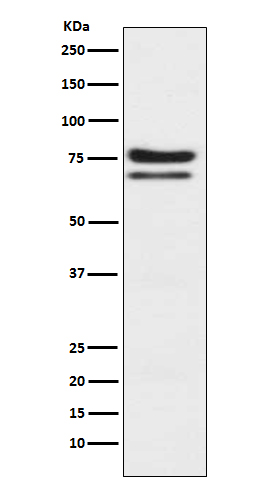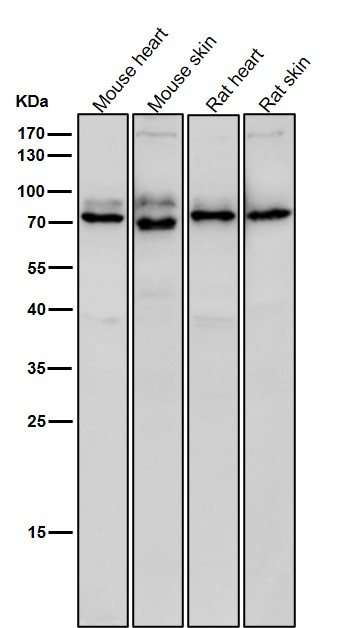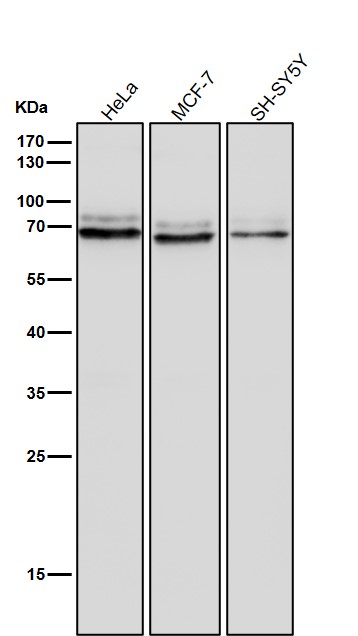


| WB | 咨询技术 | Human,Mouse,Rat |
| IF | 咨询技术 | Human,Mouse,Rat |
| IHC | IHC:1/100-1/200;IHF:1/50-1/200 | Human,Mouse,Rat |
| ICC | 1/50-1/200 | Human,Mouse,Rat |
| FCM | 1/20-1/100 | Human,Mouse,Rat |
| Elisa | 咨询技术 | Human,Mouse,Rat |
| Aliases | nPKC epsilon; PKCE; Pkcea; PRKCE; Protein kinase C epsilon; Protein kinase C epsilon type;;PKC epsilon |
| WB Predicted band size | 84 kDa |
| Host/Isotype | Rabbit IgG |
| Antibody Type | Primary antibody |
| Storage | Store at 4°C short term. Aliquot and store at -20°C long term. Avoid freeze/thaw cycles. |
| Species Reactivity | Human,Mouse,Rat |
| Immunogen | A synthesized peptide derived from human PKC epsilon |
| Formulation | Purified antibody in PBS with 0.05% sodium azide,0.05% BSA and 50% glycerol. |
+ +
以下是关于PKCε(Protein Kinase C epsilon)抗体的3篇参考文献示例,涵盖其在不同研究中的应用:
---
1. **文献名称**:*Protein kinase C epsilon mediates cerebral ischemic injury via mitochondrial mechanisms*
**作者**:Bright R, Mochly-Rosen D
**摘要**:该研究利用PKCε特异性抗体,通过免疫印迹和免疫组化技术,揭示了PKCε在脑缺血模型中的表达上调及其与线粒体凋亡通路的关联。结果显示,抑制PKCε可减少神经元死亡,提示其作为治疗靶点的潜力。
2. **文献名称**:*Role of PKCepsilon in ethanol-induced sensitization of transient receptor potential vanilloid 1 (TRPV1)*
**作者**:Khasar SG, Levine JD
**摘要**:本研究通过PKCε抗体阻断实验,发现乙醇通过激活PKCε增强TRPV1受体的活性,从而介导炎症性疼痛。抗体特异性抑制实验证实PKCε在疼痛信号传导中的关键作用。
3. **文献名称**:*PKCepsilon promotes pancreatic cancer cell migration via interaction with E-cadherin*
**作者**:Guan L, Liu Y
**摘要**:作者利用PKCε抗体进行免疫沉淀和免疫荧光染色,发现PKCε通过与E-钙黏蛋白结合促进胰腺癌细胞迁移。研究支持PKCε抗体在癌症转移机制研究中的应用价值。
---
以上文献示例展示了PKCε抗体在神经保护、疼痛调节及肿瘤研究中的实验应用,具体方法包括蛋白互作分析、信号通路验证及细胞功能研究。实际引用时建议通过PubMed或Web of Science核对最新研究。
The protein kinase C epsilon (PKCε) antibody is a crucial tool in biomedical research, targeting the PKCε isoform, a member of the serine/threonine kinase family. PKCε belongs to the novel PKC subfamily, characterized by its calcium-independent activation and dependence on diacylglycerol (DAG) or phorbol esters. It plays diverse roles in cellular signaling, regulating processes like proliferation, differentiation, apoptosis, and stress responses. Dysregulation of PKCε has been implicated in cancer, neurodegenerative diseases, cardiovascular disorders, and metabolic syndromes, making it a focal point for therapeutic and mechanistic studies.
PKCε antibodies are widely used to detect endogenous PKCε expression and localization in tissues or cultured cells via techniques such as Western blotting, immunohistochemistry (IHC), immunofluorescence (IF), and flow cytometry. These antibodies are typically raised in hosts like rabbits or mice, with specificity validated through knockout controls or siRNA-mediated silencing. Monoclonal antibodies offer high specificity, while polyclonal versions may detect multiple epitopes, enhancing sensitivity for low-abundance targets.
Researchers rely on PKCε antibodies to explore its structural domains, including the N-terminal regulatory region (C1. C2-like domains) and the C-terminal catalytic kinase domain. Commercial antibodies often cite applications in cancer research (e.g., tumor invasion), neuroscience (e.g., synaptic plasticity), and cardiology (e.g., ischemic preconditioning). Variability in antibody performance across vendors underscores the need for rigorous validation in specific experimental contexts. Overall, PKCε antibodies remain indispensable for unraveling the isoform-specific functions of this multifaceted kinase.
×